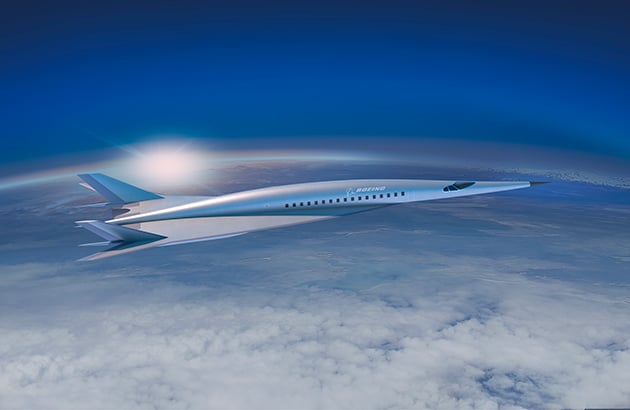Boeing unveiled a rendering of a hypersonic jet – capable of flying as fast as Mach 5, just under 3,900 miles per hour.
The company says it is looking into what could be possible for flight in the future and is “innovating now to make it happen”.
The rendering of the concept jet was unveiled at an aerospace conference in Atlanta.

The concept plane Boeing presented could potentially fly across the Atlantic in under three hours. A flight from New York to London currently takes about seven hours.
Boeing said that the passenger concept could have military or commercial applications, adding that it is only one of several hypersonic vehicle concepts that cover a wide range of potential applications its engineers are looking into.
“Engineers are working companywide to develop enabling technology will position the company for the time when customers and markets are ready to reap the benefits of hypersonic flight,” Boeing said.
“We’re excited about the potential of hypersonic technology to connect the world faster than ever before,” said Kevin Bowcutt, senior technical fellow and chief scientist of hypersonics.
“Boeing is building upon a foundation of six decades of work designing, developing and flying experimental hypersonic vehicles, which makes us the right company to lead the effort in bringing this technology to market in the future,” Bowcutt added.
While Bowcutt can’t determine when hypersonic flight for global passengers will be a reality he did say that a hypersonic passenger vehicle could be airborne within the next 20 to 30 years.
Since the Concorde was retired in 2003 commercial airlines stopped offering consumer flights at supersonic speeds (exceeding Mach 1).
Some experts, such as John Plueger, president and CEO of Air Lease Corporation, are unsure whether the potentially high costs of hypersonic travel will make it a viable business option for airlines over the next decade or two.
“It’s hard for me to see, at least in the next 15-20 years, that it’s going to be so cost competitive that it’s going to compel the airlines to take a stab at it,” Plueger told CNBC.
